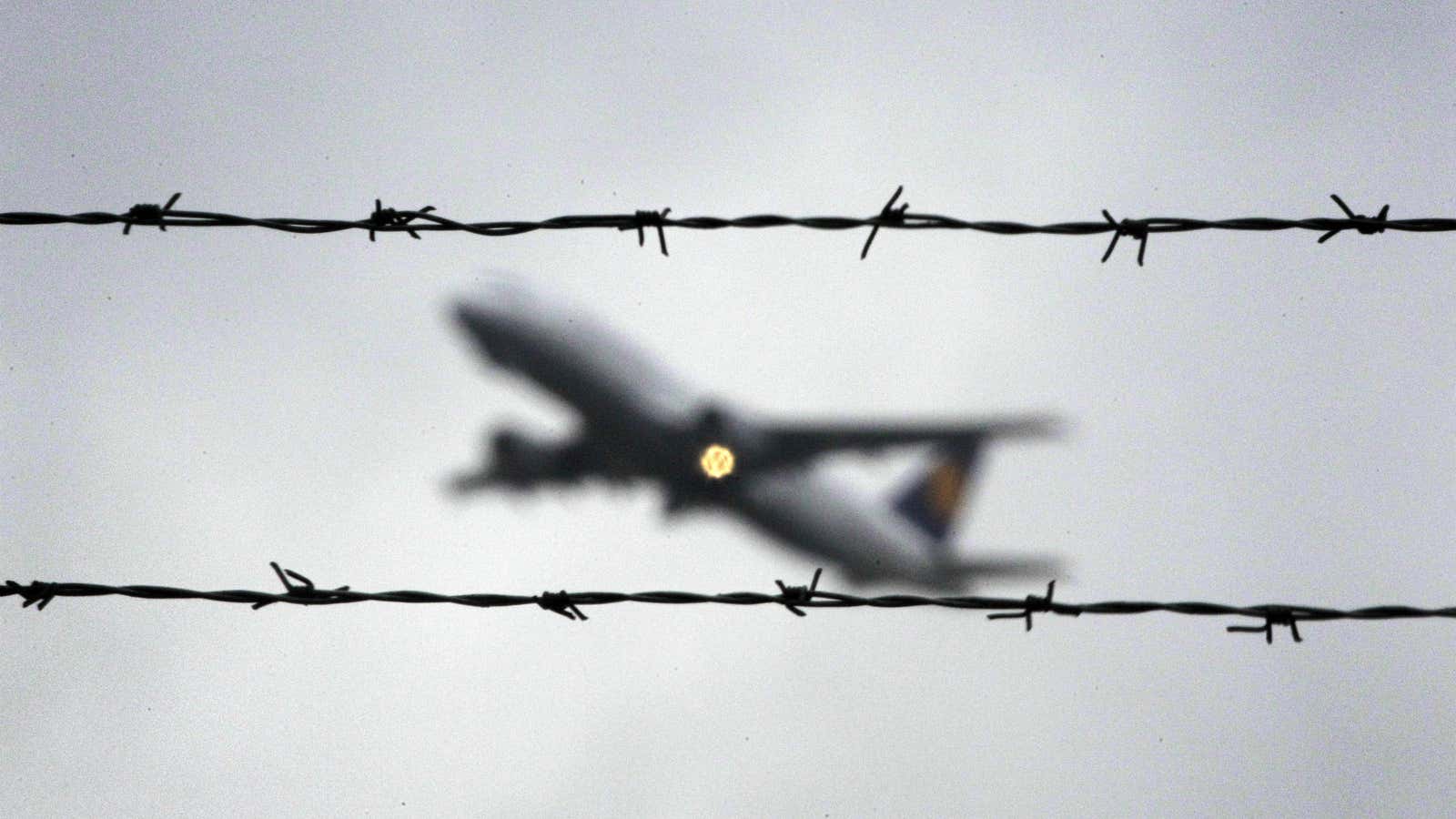This post has been updated.
Earlier this month I took a British Airways flight from London to Los Angeles. About 30 minutes before landing, two flight attendants approached the man seated in front of me. They informed him that a sexual-assault complaint had been made against him during the flight, and police would escort him off the plane upon landing.
The man—and his wife, who was seated next to him—processed this news with an eerie degree of calm. He asked the flight attendants a question about his landing card; they told him he had far bigger problems. He watched the moving map for the rest of the flight. He and his wife never spoke.
When we arrived at the gate, police officers and a number of officious-looking people with clipboards boarded the plane and asked him to come with them. The couple gathered their things—again, so calm—and did as they were told. A pleasant lady from the Federal Bureau of Investigation took my name and those of everyone seated in the two rows in front and behind him. And that was it.
Unlike this man, I had many, many questions. Among them: how often does this happen?
No airline contacted for this story would disclose statistics for sexual assault or other crimes on their planes. Nor does the US Federal Aviation Administration or the Transportation Security Administration. The US Federal Bureau of Investigation, which has jurisdiction over flights terminating in the US from the moment the doors close to the time they reopen, logged 170 crimes aboard aircraft in 2014. There have been 169 cases so far this year. The agency doesn’t share how many of those were sexual assaults.
But the cases that make it to court suggest that sexual assault occurs on airplanes more often than most people probably realize.
Last year, a flight en route to Japan had to return to Hawaii after a male passenger barged into a restroom and attempted to rape a female passenger. The woman managed to push the emergency button; crew had to remove the door to stop the assault and restrain the attacker.
That kind of conspicuous violence is rare, said Robert Hughes, chief of the FBI’s section overseeing in-flight crime. Most sexual assault cases involve perpetrators groping passengers they believe to be sleeping—typically on long flights, when it’s dark and there are fewer people walking the aisles.
In September, a 57-year-old man pleaded not guilty to molesting a girl flying alone on an American Airlines flight from Chicago to New York. A Catholic priest was sentenced to federal prison in August for groping a female seatmate on a flight to Los Angeles.
Publicized cases like these stretch back years. In 2005, the former leader of Hawaii’s House of Representatives resigned after being found guilty of abusive sexual conduct for fondling a woman on an airplane.
After four sexual assault cases were reported on planes landing in the Washington DC metro area, congresswoman Eleanor Holmes Norton introduced a bill in 2014 requiring the FAA to collect data on sexual assault in passenger airplanes. It failed to pass.
If a person is subjected to unwanted touching or other crime on board an aircraft, they should tell a flight attendant as soon as possible, Hughes said. Alleged perpetrators and witnesses to the crime are much harder to find once everyone has left the plane.
Once informed of a crime on board, flight attendants tell the pilot, who decides whether the airplane should continue to its destination or divert to another airport. They also alert air traffic control at the arriving airport, which coordinates law-enforcement authorities that can meet the plane upon landing and make any necessary arrests.
“A lot of times these crimes go unreported because the victim feels ashamed, they feel intimidated by the person sitting next to them,” Hughes said. “The key is to report it immediately.”
He also suggested that women traveling alone avoid alcohol, sleep-inducing drugs, and sleep itself to guard against attacks on long flights. (Our take: women really, really should not have to do this.)
British Airways wouldn’t comment on the arrest I witnessed. The FBI’s Los Angeles office said the matter is under investigation. No one has been charged.
(This post has been updated to include new information from the FBI.)
